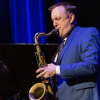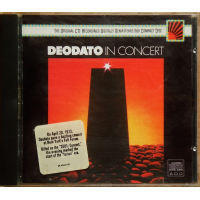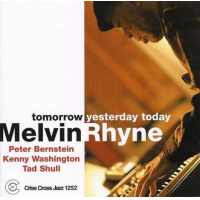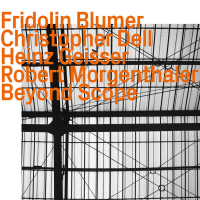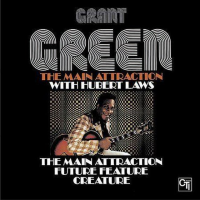Home » Jazz Articles » Liner Notes » Bill Bruford: The Winterfold Collection 1978-1986
Bill Bruford: The Winterfold Collection 1978-1986
Bruford first came to attention in the late 1960s with progressive rockers Yes, but made his first significant musical life decision by leaving the group arguably at the peak of its success following 1972's landmark Close to the Edge. Joining the aggressively experimental and improvisation-heavy Larks' Tongues in Aspic-era incarnation of art rock group King Crimson that same year, Bruford found a simpatico partner in Crimson co-founder/guitarist Robert Fripp—and a free improv teacher in its gloriously unpredictable percussionist, Jamie Muir. But it was Bruford's shared interest with Fripp—technology as a driving force for creating new musical contexts—that would drive not only successive Crimson line-ups to the present day, but the drummer's solo career as well.
Bruford's time with Crimson—continuing on and off until 1998—also manifested a desire to work in symbiotic relationships where he was in equal part teacher and student. While the advent of monophonic and, in particular, polyphonic synthesizers were contributing factors to his first two releases as a leader—1977's Feels Good to Me and 1979's One of a Kind, the latter introducing his first touring group, Bruford—they were also defined by yet another Bruford marker. Bruford releases are never short on creative and outstanding percussion work, but the focus is always on the writing, the ensemble and, in increasing doses, improvisation.
Bruford's early albums rarely featured drum solos, but they weren't necessary to hear and feel his mathematically precise and programmatically complex writing and playing, anchoring the group with élan and nuanced sensitivity. Considering the range of music heard on Feels Good To Me, One of a Kind, 1979's raw, live-to-two-track The Bruford Tapes and the 1980 swan song Gradually Going Tornado, Bruford's writing had matured considerably since his impressive but wryly brief solo compositional debut, "Five Per Cent for Nothing," from Yes' 1972 hit album, Fragile. Alone or in collaboration with Feels Good singer Annette Peacock, National Health co-founder/keyboardist Dave Stewart, guitar icon-in-the-making Allan Holdsworth and perennially undervalued bass phenomenon Jeff Berlin, Bruford's musical voice was already well-formed by the release of Feels Good To Me.
For those who thought Bruford was "just" a drummer—albeit a damn fine one—Feels Good was a kick in the pants. A multi-instrumentalist equally adept on marimba and vibraphone as he was conventional kit, here also was a rich songwriter capable of dark cynicism ("Back to the Beginning"), great lyrical beauty ("Seems Like a Lifetime Ago Pt I") and greater live-in-the-moment optimism ("Adios a la Pasada," which closes both Feels Good and this compilation). All three tracks feature the sultry yet frighteningly immediate delivery of singer Annette Peacock, praised by Bruford as "an early innovator in the half-light between fully singing a line, speaking a line and delivering something between the two."
But while Bruford stretched the limits of lyric-based song form, the group also navigated demanding instrumentals, such as the episodic, through composed "Seems Like a Lifetime Ago Pt II." The fiery version of Feels Good's counterpoint-rich "Sample and Hold"—culled here, with a rare drum solo intro, from The Bruford Tapes, a radio broadcast with no additional mixing or post-production—finds the quartet still thriving after Holdsworth's departure, with the excellent John Clark filling those very large shoes.
One of a Kind's anthemic "Hell's Bells" was co-written by Stewart and National Health co-founder Alan Gowen, who tragically passed away at the age of 33 in 1981. "Travels With Myself" begins deceptively as a ballad, but features a distinctively muscular Berlin solo before picking up speed for the legato, vibrato-driven playing that was already turning Holdsworth into a guitar legend and a melody-focused synth solo from Stewart. "Dave took to the new synth technology like a duck to water," says Bruford.
Following Holdsworth's departure, Bruford relates "being impressed with [Weather Report's] Heavy Weather, [so] we flew producer/engineer Ron Malo to the UK for Gradually Going Tornado, in the vague hope that whatever he had would rub off." Tornado represents a stylistic return to song form on half the disc, this time with Berlin at the mike. The four-on-the-floor "The Age of Information" and up-tempo, metrically challenging "The Sliding Floor" are no less progressive for Berlin's vocals, with Stewart imaginatively approaching, but never imitating, the "keyboards as orchestra" aesthetic of Weather Report's innovative Joe Zawinul.
Berlin's thundering bass propels "The Sliding Floor," referencing the late bassist Jaco Pastorius' paradigm shifting repositioning of the instrument. Still, like Stewart, he never sacrifices his own voice, while the ever-resourceful Bruford effortlessly transcends groove to create a vivid and texturally shifting orchestral underpinning. Bruford saw his group as "primarily an instrumental rock group with fancy chords," and there's no question that it deserved all the accolades for personal style and innovation liberally bestowed upon it. But change was in the air.
Following the dissolution of his group, Bruford rejoined King Crimson from 1981-1984, significant for his incorporation of the emerging electronic drum technology that was eventually to motivate the creation of his first Earthworks group, documented on The Summerfold Collection. Around 1983, the Swiss keyboardist Patrick Moraz—a post-Bruford Yes alumnus who'd recruited Berlin for his first solo album, 1975's The Story of I—"came to live about 500 yards away from me in the Surrey Hills," Bruford explains, "making it very convenient to do some playing together."
The resulting albums—1983's Music for Piano and Drums and 1985's more sonically far-reaching Flags, with both musicians bringing electronics to the mix—foreshadowed Bruford's later collaborations with Dutch pianist Michiel Borstlap, albeit in a far more structured context. Despite its unmistakable yet oblique form, Music's "Symmetry" finds Bruford playing more loosely, in an intimately responsive style more clearly reflective of early jazz influences including Max Roach, Art Blakey and Joe Morello. Bruford's tribal rhythm on "Blue Brains" also augurs later work with the New Percussion Group of Amsterdam and World Drummers Ensemble.
Moraz's majestic "Flags" is supported by some of Bruford's most understated and elegant playing to date, while Flags' collaborative "Everything You've Heard is True" combines fervent groove, electronic percussion, vibrant acoustic piano and synthesizer layers to turn this intimate duet into a sonically expansive tour de force.
Bruford's defining qualities may have been formed in a largely electric environment, but they would continue to grow, tracing a clear aesthetic line from his earliest Winterfold discs through to his most recent Summerfold efforts. The tale is to be continued on The Summerfold Collection, where Bruford increasingly turns his attention towards the intimate, the responsive and the improvised, and the untapped potential of largely acoustic ensembles.
Related
Bill Bruford: The Summerfold Collection 1987-2008
Liner Notes copyright © 2026 John Kelman.
The Winterfold Collection 1978-1986 can be purchased here.
Contact John Kelman at All About Jazz.
With the realization that there will always be more music coming at him than he can keep up with, John wonders why anyone would think that jazz is dead or dying.
Track Listing
Back To The Beginning; Seems Like A Lifetime Ago Pt.1; Seems Like A Lifetime Ago Pt.2; Hell's Bells; Travels With Myself, And Someone Else; Age Of Information; The Sliding Floor; Symmetry; Blue Brains; Flags; Everything You've Heard Is True; Sample And Hold; Adios A La Pasada.
Personnel
Bill Bruford
drumsDave Stewart
keyboardsAllan Holdsworth
guitar, electricJeff Berlin
bass, electricPatrick Moraz
keyboardsAnnette Peacock
vocalsKenny Wheeler
flugelhornThe Unknown John Clark
guitar, electricAdditional Instrumentation
Bill Bruford: acoustic and electronic drums, percussion (tuned and untuned); Allan Holdsworth: electric guitar (1-5, 12, 13); Dave Stewart: keyboards, synthesizers (1-7, 12, 13); Jeff Berlin: bass (1-7, 12, 13), vocals (6, 7); Annette Peacock: vocals (1, 2, 13); The Unknown John Clark: electric guitar (12); Kenny Wheeler: flugelhorn (2); Patrick Moraz: piano (8-11), Kurzerill 250 sampler (10-11).
Album information
Title: The Winterfold Collection 1978-1986 | Year Released: 2009 | Record Label: KOCH Records
Tags
PREVIOUS / NEXT
Support All About Jazz
 All About Jazz has been a pillar of jazz since 1995, championing it as an art form and, more importantly, supporting the musicians who make it. Our enduring commitment has made "AAJ" one of the most culturally important websites of its kind, read by hundreds of thousands of fans, musicians and industry figures every month.
All About Jazz has been a pillar of jazz since 1995, championing it as an art form and, more importantly, supporting the musicians who make it. Our enduring commitment has made "AAJ" one of the most culturally important websites of its kind, read by hundreds of thousands of fans, musicians and industry figures every month.









